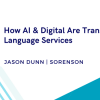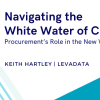Tony Strong is the CEO of UK-based multi-channel service provider Parseq. Way back when we launched our oNexus platform, Parseq were one of the founding oNexus partners and we were promised an interview with Tony - and now our paths have finally aligned.... Outsource caught up with him at last to hear his thoughts on his new role as CEO, the invaluable importance of organisational culture - and consolidation in the customer contact industry.
Outsource: Tony, you were appointed CEO of Parseq as recently as last summer: what was it about the company that made you decide to take the role? And have any expectations you had prior to joining been borne out by your experience at the helm thus far?
Tony Strong: From the off-set it was clear to me that Parseq had an impressive client base which could be built upon. I could see that Parseq had valuable assets which had room to grow and a management team which was passionate, ambitious and incredibly talented. There was an opportunity for me to lead this expansion and govern change across the company to enable the team to reach their full potential.
My expectations before I joined have been more than borne out through my experience so far. We’ve got a great team, a great proposition and the enthusiasm to achieve our goals. It feels like we have a huge amount of energy behind what we’re doing. Since we revamped the way we position our services we’re renewing contracts with existing clients, recruiting at a rapid rate and we’re continually adding new clients – many very prestigious.
At the heart of our new proposition was a desire to simplify the language we had used in the past. Every service we offer, function we develop and even how we recruit our employees has a sole focus and that’s to achieve our clients’ objectives. Everything we do now relates to these objectives – to acquire, to retain and to improve. It’s been received brilliantly by our employees and clients – old, new and prospective. Something which is evident in the number of new clients we’ve brought on board, contracts we’ve expanded and talent we’ve attracted.
O: How would you describe “the Parseq culture” as you see it – and how much, if at all, do you feel you want to shape that culture further from your position at the top?
TS: I’m really proud of the culture we’ve created at Parseq. We’ve grown through acquisition and in turn we’ve had to tackle the challenge of blending a number of different company cultures into one. Integration is key, that’s obvious, but sometimes it can be easier said than done. Thankfully we have a team of over 2,000 employees who have really embraced our vision. Overtime we have brought together the best elements of each of the businesses we’ve acquired and enhanced them and I’ve been impressed by the speed in which the business has adopted the changes we’ve introduced.
When I joined Parseq I could see that there was a strong sense of wanting to do the right thing for our clients. Every employee I met genuinely wanted to leave the office at the end of the day feeling proud of what they had given the business and their clients. They just needed this intention formalising and packaging up into a clear strategy.
Our culture is really important not only to our HR and recruitment strategies, but it’s at the very heart of everything we do. It’s intrinsic to our vision of becoming the most trusted partner in the industry by delivering results, high performance, by being accountable and always transparent. I feel confident that each employee now understands their role far better and they’re committed to playing their part whether they are acquiring new customers, retaining market share or improving processes on behalf of our clients.
O: Staying on the topic of culture: how important do you see an organisation’s culture being as a differentiator in a marketplace where differentiation is increasingly critical? And how can a company such as Parseq actually convey an idea of its culture to potential buyers in order to achieve that differentiation?
TS: We relaunched our corporate brand identity and strategy. It was a bold move for the industry as we challenged the perception that an outsourcer should be a white label offering and purely as resource to tap into efficiencies – mostly focused on cost saving. It’s a perception that I feel the industry itself has encouraged, but for us, it undermines what we do and just scratches the surface of the value, experience and expertise an outsourcer like Parseq can offer both to the client and our employees.
Everything we do focuses on three core objectives; acquire, retain and improve. This runs through our entire operation from how we service our clients – for example, we help acquire new customers, retain market share and improve processes and efficiencies – through to how we recruit and train our employees and also our culture. Gone is the jargon that is often used within the industry. Instead, we’re so confident in what we do, who we are and what we can offer that we’ve simplified everything so it’s more accessible and there is a direct link between our work and our clients’ objectives. My job has been to transform complexity into simplicity.
O: What do you see as being other key differentiators of value in today’s outsourcing landscape – and how well is Parseq achieving and portraying those?
TS: The biggest differentiator for me is changing the relationship between outsourcer and client. For years the industry was viewed as a white labelled commodity. A service that was selected purely on cost and immediate convenience. It was a relationship which both the industry and client embraced, but does that really demonstrate true value? Not for me. By changing this relationship to one of a trusted partner, rather than a supplier we’re able to get closer to our clients’ businesses and deliver genuine value through offering insight, expertise and perhaps even unlocking areas of a client’s business they hadn’t previously explored.
Gone are the days of the somewhat cold, client and supplier relationships. Instead businesses want partnerships which allow access to experience, technology and insight which they may not otherwise be able to invest in or have access to. It’s an approach which has seen us increase our client base significantly.
O: BPO is constantly on the verge of one revolution or another, normally driven by emerging technology – yet it does seem like we’re genuinely experiencing revolutionary times today thanks to the SMAC nexus and, going forwards, advances in automation technology. How are these factors affecting Parseq and the way your organisation operates – and plans for the future? More broadly, can you give us some thoughts on how these technologies have impacted the outsourcing space during your time in the business – and on where you see us going from here?
TS: It's vital to stay ahead of the curve. As a trusted partner our customers look to us to advise on what technologies they should be taking advantage of and give them access to it so they don’t have the hassle or the pressure of investing themselves. That’s our role – we enable them to tap into a broad experience base, invest in the correct infrastructure for them, leverage economies of scale and improve service to the end customer.
We have invested a significant amount to future proof our services using a common platform that brings leading edge multi-channel call centre technology. Going beyond this, we’re helping our clients to build in-depth understanding of their customers’ worlds by drawing upon our analytical tools and real time insight to shape their future omnichannel strategies.
O: We continue to read about various “wars” for, of and even on talent – do you feel that Parseq’s talent acquisition philosophy is as strong as it could be? Could you tell us a bit about that philosophy in terms of what you look for in potential hires (and how, if at all, that’s changing as a new generation enters the workforce) and in terms of how you attract and retain them?
TS: I’m not sure there really is a ‘war of talent’. If there is, it’s not something we’ve experienced – especially since launching our employer brand. Alongside launching our corporate identity, we also developed our employer brand and in turn a Training Academy and a £1m pledge for employee training. Every one of our 2,000 workforce plays a vital part in our business and because of that it was critical that we developed an employer identity that attracted the right candidates, retain their skills, expertise and enthusiasm and creating opportunities for improvement. This reinforces our proposition again of acquire, retain and improve.
Our change in business proposition has certainly been a weapon in our recruitment armoury. Especially during the recruitment of senior positions we’ve found that this is a key differentiator. The industry has been crying out for change and so have those within it. By instigating these changes we’re reaping the rewards from attracting some of the top talent in the market.
O: Has a BPO provider such as Parseq had to adjust the ways in which it works with its clients over the past few years as a result of changing requirements and expectations on the part of buyers? Are you offering different contractual forms, for example, or seeing radical new governance structures being put in place around your agreements? Do you think there’s been a shift in the power balance between buyer and supplier?
TS: I think companies used to make the decision to outsource with an aggressive focus on cost rather than adding value, but things have changed and the approach is now more collaborative. It’s a partnership structure where there is a unit price for the work you’re doing, but often we can help a company unlock value they wouldn’t be able to unlock themselves – a gain share model – which can only happen in a mature relationship and relatively long contractual agreement.
Any reward for us is linked to a deliverable our customers set us and they will see the benefit in their business metrics. If our customers are savvy they will identify the pinch points in their business and make it part of the contract. They get to unlock a benefit they don’t have the capability or wherewithal to deliver themselves – and we both share in the financial rewards.
All this leads to a sustainable relationship that has quality, repeatability, partnership, innovation and continuous improvement at its heart. After all, no-one is going to enter into a ten-year contract and expect to be doing the same thing in the same way in ten years’ time. For me there is no longer a simple client and supplier relationship, it’s all about gain sharing through partnership. That’s the only way the industry will grow.
O: Grab a crystal ball… Can you share with our readers some predictions for how the global outsourcing space will evolve over the next business cycle? What will be some of the big trends (or even specific events, if you feel that bold) that will determine the course of that evolution? Do you see, for example, a lot of market consolidation ahead?
TS: I do see consolidation, I think there are 600 contact centre providers, we are 10th in the list and there is lots of acquisition activity with companies buying market share and I expect that to continue. The sector is growing five per cent year-on-year driven by onshoring of activity. Offshore used to be a cheaper option, but the standard of living has gone up in the countries we’ve traditionally offshored to, so wages are going up at the same time as consumers in the UK are becoming more discerning. They want a good customer experience, they want their query to be answered by the person who answers the phone and we need to make sure the customer is treated fairly; ultimately having an experience that makes them happy – so I think the trend of work coming back onshore will continue.
The other area of focus is business continuity plans; they need to be robust and tested with a client on a regular basis. If they are putting more volume through a partner they need to know their risks are managed and that is putting more of a burden on the BPO provider as the share of the risk increases.
There is a huge opportunity for the sector to grow, currently only 26 per cent of the market is outsourcing and that’s the big corporates. The mid-size businesses are now looking at it as well and that’s where companies like Parseq will benefit ahead of the larger BPO providers. That’s because of the way we approach our client relationships, the intimacy piece is missing from the larger providers. We’re experts in our field and by combining this with our agility and flexibility we really do drill down to understand our clients’ needs. We’re recruiting and retaining the best talent, and I think this will only continue, especially as we are beginning to witness the transfer of talent into the BPO market from completely different industries.
O: Perhaps in a similar vein: if you could wave the proverbial magic wand and change one thing about the industry today, what would it be?
TS: I’d like to change the perception of our industry so we move from being a commodity provider to a trusted partner who adds value to our customers’ businesses.
O: Finally, a question we often close with: what’s your definition of “the perfect client”?
TS: For me it’s really simple and links back to our vision of working with clients who see us as a trusted, collaborative partner and recognise us as an extension to their business.




